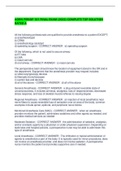Exam (elaborations)
AORN PERIOP 101 FINAL EXAM (2022) COMPLETE TOP SOLUTION RATED A
- Course
- Institution
AORN PERIOP 101 FINAL EXAM (2022) COMPLETE TOP SOLUTION RATED A All the following professionals are qualified to provide anesthesia to a patient EXCEPT: a) anesthesiologist b) CRNA c) anesthesiology assistant d) operating surgeon - CORRECT ANSWER d) operating surgeon Of the following...
[Show more]



